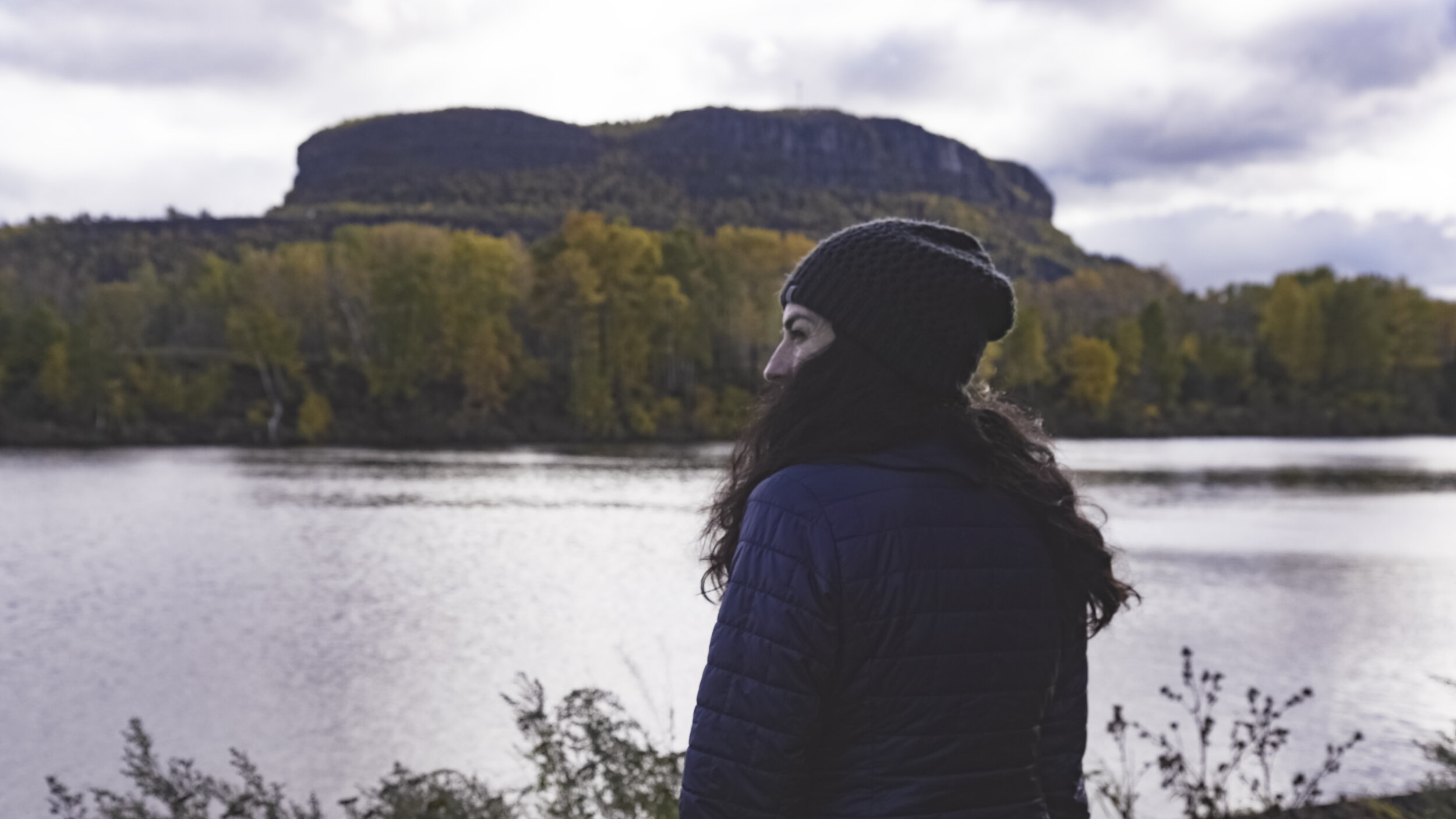Original-Cin Hot Docs Interview: Tanya Talaga talks Spirit to Soar and Thunder Bay Indigenous youth murders amid the beauty of the North
By Jim Slotek
One of the first journalists to shine a light on the dark reality of dead First Nations youths in Thunder Bay, Tanya Talaga admits she is sometimes accused of, “being part of the national media, targeting Thunder Bay.”
But the Toronto-born Talaga has fond childhood memories of the place that has focused her attention.
The author of the book Seven Fallen Feathers: Racism, Death, and Hard Truths in a Northern City is the daughter of a Polish-Canadian father and an Ojibway mother from Fort William First Nation, and was a longtime Toronto Star reporter before becoming an author and starting her own production company. (Her first reports about Indigenous people in the city were published in the Star in 2011).
Journalist/filmmaker Tanya Talaga in the shadow of Fort William First Nation’s Mount McKay.
“I would go up in the summers with my mom, she’d be in her Monte Carlo with her Abba tapes and drive us up two days to Thunder Bay. It’s a long trip, especially when your brother gets carsick,” she says.
“It is insanely beautiful. When I’m there in Thunder Bay, you have this feeling of connection to the land and the water and the place that I’ve always had trouble explaining to people. I was trying to bring forward the land and the water as characters in the film.”
The film is Spirit to Soar, one of the features at this year’s virtual Hot Docs festival. It’s a look at the aftermath of the inquest into the deaths of the seven - Jethro Anderson, Reggie Bushie, Robyn Harper, Kyle Morrisseau, Paul Panacheese, Curran Strang, and Jordan Wabasse - its 145 recommendations, and a report by Ontario’s independent police watchdog of systemic racism by local police.
And it’s an extremely personal film. At one point, lawyer Julian Falconer, one of the legal representatives for the Nishnawbe Aski Nation, takes her up in his small plane to absorb the landscape.
PROUDLY SUPPORTS ORIGINAL-CIN
“Julian Falconer said it all in that scene. When you’re seeing it in a plane and you’re flying low… I mean the rocks are incredible, the fresh water, the land formation, absolutely stunning. The juxtaposition of the racism in the city with the beauty of the land is heartbreaking.”
Asked if she expected to see and film improvements four years after the publication of her book, she says simply, “No.”
“I mean, I’ve been following what’s been happening. And every year, there is an update done by Jonathan Rudin and Aboriginal Legal Services in Toronto. And every year they do a report card on the 145 legal recommendations. And it has waned.”
“The good thing about what’s happened in Thunder Bay is more people are absolutely aware of the situation.”
As for the criticism, Talaga says, “it goes both ways. There are a lot of non-Indigenous people in Thunder Bay who have written me notes and emails saying, ‘Thank you for writing about this. I didn’t know.’
“This speaks to the division of the city, the Red State and the White State. What you see in TB is the huge effect of colonization and colonialism.”
Childhood memories aside, Talaga says her discovery of her culture came late. I was in my early 20s when I found out I had a sister (taken for adoption), and I was in my early 20s when I found out my mother had brothers in the residential school system.
“We didn’t talk a lot about that. My mother had a very different upbringing in many ways, and she didn’t talk about it very much at all. She would cry sometimes at night, which I would later know was about my sister or her brothers.”
Her connection to Northern Ontario has obviously grown. She was a guest at the opening of Sioux North High School in Sioux Lookout in 2019 (closer secondary school access to First Nations students was one of the legal recommendations of the inquest), and she has an honourary doctorate from Lakehead University.
“I’ll always tell stories about our people in Northern Ontario. That’s a place that I feel the most comfortable with, and I feel honoured to tell the stories of people in the North.
“I think of (the late Ojibway author, of Indian Horse fame) Richard Wagamese. And I think of David Adams Richards, who wrote about the Miramichi, and that’s where he found his creative home.
“I feel that very much with Thunder Bay and Northern Ontario.”
Spirit to Soar. Directed by Tanya Talaga and Michelle Desrosier. Part the Canadian Spectrum program at Hot Docs 2021, April 29-May 8.



